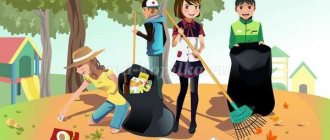Signs about the weather in February
- In early February it is warm and the snow is melting - a mediocre harvest.
- If February is cold, it means a favorable summer.
- February is cold and dry - August is hot.
- Warm February means a cold spring, and frosty February means a favorable summer.
- There is a lot of frost in February - in summer there will be a lot of dew and a lot of honey.
- Bright stars in February indicate frost, dim stars indicate thaw.
- If February turns out to be rainy, then spring and summer can be expected to be the same. A fine February foreshadows drought in the summer.
- Severe frosts mean a short winter.
- At the end of February there are a lot of long icicles - for a long spring.
- Snowless February threatens summer drought.
- The colder the last week of February, the warmer it will be in March.
- Thunder in February means strong winds.
Parent meeting in the secondary group “Ecology and us”
Parent meeting in the secondary group “Ecology and us”
Target:
1. Increase parents’ interest in environmental education of children and ecology in general.
2. Involve parents in the work of the group and kindergarten to form an environmental culture for preschoolers.
Meeting plan:
1. Conversation “What is environmental education?”
2. Game "Chamomile"
3. The word is a relay race
4. Preparation for the summer period, assistance from parents in arranging and landscaping the site.
5. Miscellaneous.
Progress of the meeting:
Parents sit down, fill out a registration sheet, while music from the program “In the Animal World” plays.
Educator: Good evening, dear parents! Thank you for taking the time to come to the parent meeting. After all, the leading role in raising a child belongs to the family and its way of life. The family is a source that nourishes a person from birth, introduces him to the environment, and gives him the first knowledge and skills.
More and more often we hear and pronounce the word “ecology”. It is advisable to start environmental education from early childhood, developing an understanding of the beauty of nature and love for it.
What is environmental education? (Parents' answers).
This is the knowledge of living things that are close to the child, in interaction with the environment, and on this basis the development of the correct forms of interaction with him. By attracting children to close communication with nature, to the knowledge of communication with nature, knowledge of the world of plants and animals, we, adults, contribute to the active development in children of such qualities as kindness, patience, hard work and mercy. These traits, laid down in childhood, will firmly become part of a person’s character and become his foundation. Then you can be calm for nature and the younger generation.
Preschool childhood is the initial stage of the formation of a person’s personality, his value orientation in the world around him. During this period, a positive attitude towards nature, the “man-made world”, towards oneself and the people around them is formed.
“Life today is impossible without environmental knowledge. We, people, need them like air, like a cure for a disease, the diagnosis of which is indifference to our common Home, to Nature” (Valery Arkadyevich Alekseev - historian and philosopher).
Nature itself makes it possible to comprehensively develop a child, broaden his horizons by showing the relationships in nature, involve children in joint activities, encourage the child to sympathize, empathize, and desire to help with deeds. What will help us first? (Parents' answers).
Yes, these are various walks and observations, during which it is necessary to teach the child to draw independent conclusions while observing weather phenomena. Maintain interest in the surrounding world, animate and inanimate natural phenomena.
While walking, observe what is happening in nature, enrich children with new knowledge, which will be the basis for a conscious attitude towards it, and also develop a sense of beauty in children.
Environmental education is a continuous process of training, education and development of a child, aimed at developing his environmental culture, which manifests itself in an emotionally positive attitude towards nature.
As practice shows, modern preschoolers have a large amount of knowledge about nature. However, this knowledge is often formed spontaneously, under the influence of television programs, advertising, and cartoons. Only in the process of purposeful work of the kindergarten and parents can an ecological culture, ecological thinking, and environmental consciousness be formed in children.
Happiness is being with nature, seeing it, talking to it. We must cherish this happiness and teach it to our children.
Nature is an inexhaustible source of aesthetic feelings and experiences. You cannot love nature without knowing it. The more you know, the more you understand and love. In a few years, our children will become adults. And responsibility for the life of our society, for the fate of our land will fall on their shoulders. And it depends on us adults whether they will love and take care of our nature, whether they will be able to foresee the consequences of their activities in the ecological environment.
Seasons... They usually replace each other, and over the years we adults cease to be surprised and rejoice at how the colorful splendor of autumn gives way to the severity of the black and white graphics of winter, how the barely visible watercolor spots of spring are overshadowed by the generous multicolor palette of summer. And only sometimes the smell of rotten leaves or the bizarre shape of a cloud suddenly awakens in us memories of childhood - of that amazing time when the onset of each new season became perhaps the most important event of our lives.
And how we loved walks! Because on the street we could jump, run, study the contents of puddles, watch the ice melt in warm hands, watch the crows cry...
In a word, we, without even suspecting it, were experiencing the world in all its beauty, developing and strengthening physical health, observing and drawing conclusions.
In preschool age and in favorable conditions, the intellectual and volitional sphere of the child intensively develops, the foundations of a correct, conscious attitude to objects and phenomena and the surrounding reality are laid. An important factor influencing children is purposeful, systematic educational work, in which the purposeful process of getting to know nature occupies a particularly important place.
What attitude towards nature can we instill in children? (Parents' answers):
— Berezhnoe
— Caring
— Humane
It is necessary to teach to see the beauty of living things, appreciate it and strive to help it (in winter - feed birds, shake snow from tree branches).
To develop an interest in knowledge, to explore the world around us, to help the child learn more about the secrets of living and inanimate nature.
To form a desire to become a friend and defender of nature, to cultivate a caring attitude towards nature.
The outstanding Irish playwright Bernard Shaw said: “I have an apple, you have an apple, let’s exchange them, everyone will still have one apple. I have a thought, you have a thought, let’s exchange them, there will be two thoughts.” And now I invite you to also exchange thoughts and play the game “Chamomile”






